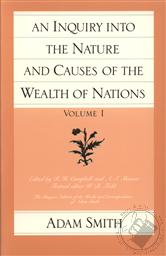An Inquiry Into the Nature and Causes of the Wealth of Nations: The Glasgow Edition of the Works & Correspondence of Adam Smith (In Two Volumes) (Book/ Paperback)
by Adam SmithProduct Overview
First published in 1776, the year in which the American Revolution officially began, Smith's Wealth of Nations sparked a revolution of its own. In it Smith analyzes the major elements of political economy, from market pricing and the division of labor to monetary, tax, trade, and other government policies that affect economic behavior. Throughout he offers seminal arguments for free trade, free markets, and limited government.
Criticizing mercantilists who sought to use the state to increase their nations' supply of precious metals, Smith points out that a nation's wealth should be measured by the well-being of its people. Prosperity in turn requires voluntary exchange of goods in a peaceful, well-ordered market. How to establish and maintain such markets? For Smith the answer lay in man's social instincts, which government may encourage by upholding social standards of decency, honesty, and virtue, but which government undermines when it unduly interferes with the intrinsically private functions of production and exchange. Social and economic order arise from the natural desires to better one's (and one's family's) lot and to gain the praise and avoid the censure of one's neighbors and business associates. Individuals behave decently and honestly because it gives them a clear conscience as well as the good reputation necessary for public approbation and sustained, profitable business relations.
Table of Contents
Introduction and Plan of the Work 10
BOOK I.
Of the Causes of Improvement in the productive Powers of Labour, and of the Order according to which its Produce is naturally distributed among the different Ranks of the People
CHAPTER I
Of the Division of Labour 13
CHAPTER II
Of the Principle which gives occasion to the Division of Labour 25
CHAPTER III
That the Division of Labour is limited by the Extent of the Market 31
CHAPTER IV
Of the Origin and Use of Money 37
CHAPTER V
Of the real and nominal Price of Commodities, or of their Price in Labour, and their Price in Money 47
CHAPTER VI
Of the component Parts of the Price of Commodities 65
CHAPTER VII
Of the natural and market Price of Commodities 72
CHAPTER VIII
Of the Wages of Labour 82
CHAPTER IX
Of the Profits of Stock 105
CHAPTER X
Of Wages and Profit in the different Employments of Labour and Stock 116
Part I. Inequalities arising from the Nature of the Employments themselves 116
Part II. Inequalities occasioned by the Policy of Europe 135
CHAPTER XI
Of the Rent of Land 160
Part I. Of the Produce of Land which always affords Rent 162
Part II. Of the Produce of Land which sometimes does, and sometimes does not, afford Rent 178
Part III. Of the Variations in the Proportion between the respective Values of that Sort of Produce which always affords Rent, and of that which sometimes does, and sometimes does not, afford Rent 193
Digression concerning the Variations in the Value of Silver during the Course of the Four last Centuries
First Period 195
Second Period 210
Third Period 211
Variations in the Proportion between the respective Values of Gold and Silver 228
Grounds of the Suspicion that the Value of Silver still continues to decrease 234
Different Effects of the Progress of Improvement upon the real Price of three different Sorts of rude Produce 234
First Sort 235
Second Sort 237
Third Sort 246
Conclusion of the Digression concerning the Variations in the Value of Silver 255
Effects of the Progress of Improvement upon the real Price of Manufactures 260
Conclusion of the Chapter 264
BOOK II.
Of the Nature, Accumulation, and Employment of Stock
INTRODUCTION 276
CHAPTER I
Of the Division of Stock 279
CHAPTER II
Of Money considered as a particular Branch of the general Stock of the Society, or of the Expence of maintaining the National Capital 286
CHAPTER III
Of the Accumulation of Capital, or of productive and unproductive Labour 330
CHAPTER IV
Of Stock lent at Interest 350
CHAPTER V
Of the different Employment
About the Author(s)
Adam Smith
Adam Smith (1723 - 1790) was a Scottish social philosopher and a pioneer of political economy. One of the key figures of the Scottish Enlightenment, Smith is the author of The Theory of Moral Sentiments and An Inquiry into the Nature and Causes of the Wealth of Nations. The latter, usually abbreviated as The Wealth of Nations, is considered his magnum opus and the first modern work of economics. It earned him an enormous reputation and would become one of the most influential works on economics ever published. Smith is widely cited as the father of modern economics and capitalism. In 2009, Smith was named among the 'Greatest Scots' of all time, in a vote run by Scottish television channel STV. Smith studied social philosophy at the University of Glasgow and the University of Oxford.
List Price: $35.00
Our Price: $30.00
You Save:
$5.00(14%)
+ Free Shipping w/ $45 min. purchase
Category: History
Format: Book (Paperback)
Publisher: Liberty Fund Inc
Date Published: Mar 01, 1982
Language: English
ISBN: 9780865970083
SKU: LT-1432
Dimensions: 6.00 x 9.00 x 3.00 (in)
Weight: 66.00 oz










